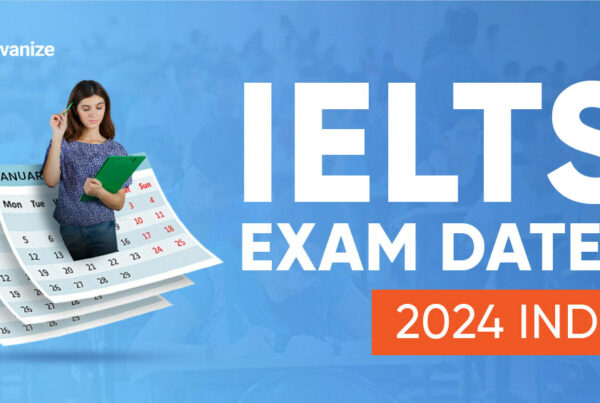
A Complete Guide To
IELTS Band Scores
Chapter 1
Overview | IELTS Band Scores : Everything you need to know
IELTS is the most popular language test in the world. If you want to study or immigrate to a foreign country, you will need this test. The IELTS test is divided into 4 sections: Reading, Writing, Speaking and Listening. All these sections are made to analyse your proficiency in the English language. But how are the scores in IELTS calculated? What is a good score in IELTS? What is a bad score in IELTS? You will find all the answers to our queries on IELTS band scores in this article. So, let’s get started.
What is IELTS?
IELTS is the most popular language test in the world. If you want to study or immigrate to a foreign country, you will need this test. The IELTS test is divided into 4 sections: Reading, Writing, Speaking and Listening. All these sections are made to analyse your proficiency in the English language. But how are the scores in IELTS calculated? What is a good score in IELTS? What is a bad score in IELTS? You will find all the answers to our queries on IELTS band scores in this article. So, let’s get started.
Why is IELTS important?
IELTS is trusted by over 11,000 organisations worldwide, so you can be certain that when you take the exam, it will be accepted by higher education institutions, companies, governments, and professional organizations all over the world.
IELTS set the benchmark for English language testing 30 years ago and is one of the founders of four-skill English language assessment. IELTS is used by the governments of Australia, New Zealand, Canada and the United Kingdom to evaluate immigration applications.
The IELTS exam is recognised in a large number of countries, including 105. Colleges and Universities, Canada, the United States, and the United Kingdom, for example, recognise this exam as a prerequisite for admission. If a candidate’s score is fewer than the objective by 0.5 points, his entrance may be denied.
As a result, any student interested in attending a foreign institution should research the IELTS criteria for his desired subject. He can only plan on obtaining admission if he can acquire the proper IELTS score. Universities seek excellent scores of 6.5 in all bands since they do not want a student to drop out of the course or miss any of the examinations owing to language difficulties.
For example, anybody who wishes to move to Australia under the new 65-point criteria must score 7 in all IELTS bands if they do not have a family residing there. This is unquestionably a difficult task.
Countries also consider a candidate’s IELTS score when deciding whether or not to hire them. He can live very comfortably there and is not reliant on the social security system once he arrives. As a result, foreign nations seeking an IELTS score do not want the immigrant to become a financial burden.
What is IDP?
IDP is another organisation, similar to the British Council, that assists applicants in realising their ambitions so that they can progress in life and travel to any location they choose. Australia, New Zealand, the United Kingdom, the United States of America, the Republic of Ireland, and Canada may all be on the list.
There are over 1,000 test centre’s across the world that may assist you take your exam under this organisation and go overseas for higher education.
What is the British Council?
The British Council, just like IDP, gives students the opportunity to leave their hometown and relocate to a foreign country where they can pursue their dreams by finding a good job, enrolling in a good and accepted university, and permanently relocating to that country with their families.
They offer testing centres in virtually every region of the nation, including Chennai, Kolkata, and New Delhi, and they assist students by facilitating access to some pretty fantastic IELTS exam resources so that they may continue their studies in an easy and enjoyable manner.
4 Sections of IELTS
IELTS was created by some of the world’s top language specialists and will measure the complete spectrum of English abilities required for success in your new work or study placement abroad.
You’ll be graded on the following criteria:
- Listening
- Reading
- Writing
- Speaking
Types of IELTS Tests
- Academic
- General Training
IELTS Academic and IELTS General Training are the two IELTS exams offered. The exam you take should be based on what you wish to accomplish.
IELTS Academic assesses if your English language skills are suitable for academic use. It analyses if you’re ready to start training or studying by reflecting features of academic language.
IELTS General Training is a test that evaluates English language proficiency in a real-life situation. The coursework and tests represent both commercial and social situations.
You will need to undertake the IELTS for UK Visas and Immigration (UKVI) Academic or General Training or the IELTS for Life Skills examination if you are undertaking the IELTS test to assist a UK visa application to employ, live, or study in the UK.
How are IELTS General and IELTS Academic Different?
Let’s have a look at the academic IELTS framework. There are the same amount of speaking and listening parts in both the general and academic versions of the IELTS. In all forms of the test, although, there is a distinction between the writing and reading parts.
In IELTS Academic, there are four questions in the reading portion that must be solved in one hour. The writing portion, on the other hand, is difficult, as two essays must be produced in one hour. The first essay must be based on the graphs and images provided in the test. The second essay, on the other hand, must be prepared on a broad topic.
In the general type of the test, the reading and writing portions will contain questions in the same style. However, the level of problems in IELTS General is much lower.
What are IELTS Band Scores?
Reading, writing, listening, and speaking are the four parts of the IELTS Test. Each of these areas accounts for 25% of your total IELTS band score, therefore no one component is more important than the others.
Your English-language abilities are assessed using band scores on the IELTS test. These band scales range from 0 to 9, with each band scoring indicating a different degree of English language proficiency.
A band score of 6 indicates a skilled user who, despite certain errors, inappropriacy’s, and misconceptions, has a generally efficient command of the language. In familial circumstances, they can also use and comprehend very complicated language.
You will obtain a band score for each section of the exam as well as an overall band score that is the aggregate of your band scores for Speaking, Reading, Writing, and Listening in your IELTS scores. Your band scores are presented as a whole as well or half band scores, with the half or whole band score scaled up to the nearest half or even whole band score.
Chapter 2
IELTS Band Scores of All 4 Sections
IELTS Writing Test Score
The IELTS Writing test is graded by qualified IELTS examiners who have undergone extensive training and are closely monitored to guarantee quality and consistency of marking, regardless of where the test is administered. Your Writing examination will be marked by at least two examiners, and frequently three or four, to guarantee the greatest degree of correctness and fairness possible.
The domains of task response, consistency and cohesiveness, lexical resource, and grammar range and correctness are all assessed on the Writing exam. You may learn more about each of these terms by looking at the Writing band descriptions, which provide extensive information about each statement and how it relates to the various band scores available.
IELTS Speaking Test Score
In the IELTS Speaking test, you will be asked to engage in a conversation similar to one you might have in everyday life. During the examination, you will be seated in a private, quiet room with a certified examiner who will converse with you. While conversing with strangers might be challenging, take advantage of the opportunity! All you must do is ask the supervisor to slow it down for you, ramp up for you, or even repeat or explain a question in IELTS. The assessor is there to help you do your best work.
The following factors are used to evaluate your speaking abilities: “fluency and coherence,” “lexical resource,” “pronunciation,” “grammatical range,” and “accuracy.” To learn more about each of these terms, see the Speaking band description, which includes extensive information about each statement and how it relates to the various band scores available.
IELTS Band Scores Reading
You will have 40 questions to answer on the Reading test. Multiple choice, True/False/Not Given, matching, and sentence finishing are among the question kinds utilised. The marking is a little different from the Speaking and Writing examinations since your responses are either right or wrong. Each correct answer will get you one mark, with the overall number of marks calculating your band score.
In Academic Reading and General Training Reading, the band score chart below provides the median number of marks necessary to earn a given band score.
|
Academic Reading Band score |
Raw score out of 40 |
|
5 |
15 |
|
6 |
23 |
|
7 |
30 |
|
8 |
35 |
|
General Training Reading Band score |
Raw score out of 40 |
|
4 |
15 |
|
5 |
23 |
|
6 |
30 |
|
7 |
34 |
|
8 |
38 |
IELTS Band Score Listening:
You will be asked 40 questions in the Listening test, all of which are related to audio samples that will be presented to you. The grading is a little different from the Speaking and Writing examinations since your responses are either correct or incorrect. Each right answer will get you one mark, with the overall number of marks calculating your band score.
The band score chart below displays the average number of marks required in the Listening exam to achieve each band:
|
Listening Band score |
Raw score out of 40 |
|
5 |
16 |
|
6 |
23 |
|
7 |
30 |
|
8 |
35 |
How is the Overall Band Score calculated?
The aggregate of the four section scores, adjusted to the closest full or half band, is the Overall Band Score. The section scores are weighted equally.
The Overall Band Score is enlisted towards the next half band if the aggregate of the four components is less than.25, and to the next full band if it is greater than.75. The total score is rounded down if the average finishes with a fraction less than .25 or .75.
Let’s learn how to use an IELTS band score calculator. Here are some examples which will help you understand the score calculation:
Example 1: If you score 6.5 in Reading, 5 in Writing, 7 in Speaking and 6.5 in Listening, you will get a score of 25. The score will be divided by 4, which will give 6.25. The score ends with a decimal of 0.25 therefore the total score will be rounded off to 6.5
Example 2: If you score 6.5 in Reading, 5.5 in Writing, 6 in Speaking and 6.5 in Listening, you will get a score of 24.5. The score will be divided by 4, which will give 6.125. The score ends with a decimal of 0.125 therefore the total score will be rounded off to 6.0
Example 3: If you score 3.5 in Reading, 4 in Writing, 4 in Speaking and 4 in Listening, you will get a score of 19.5. The score will be divided by 4, which will give 3.875. The score ends with a decimal of 0.875 therefore the total score will be rounded off to 4.0
Chapter 3
IELTS Score Descriptors
Here’s an example of IELTS score descriptions to give you an idea of what to expect in bands 6 to 9.
IELTS band score 9: Expert user
The language used by the candidate is precise and fluent. Shows complete mastery of the English language and can effectively handle complicated arguments.
IELTS band score 8: Very good user
The applicant has complete operational mastery of the English language, however there are some errors or improper usage on occasion. In new situations, misinterpretation is inevitable.
IELTS band score 7: Good user
Although the applicant has a strong grasp of the language in general, there are some errors and misunderstandings. Capable of delving into the details of a problem.
IELTS band score 6: Competent user
Although the candidate has a good grasp of the language, there are some misconceptions and misinterpretations. In familiar situations, able to utilise pretty sophisticated terminology.
IELTS band score 5: Modest user
The test taker has a rudimentary understanding of the language and can deal with broad meaning in most instances, however they are likely to make several errors. In their own field, they ought to be capable of handling basic communication.
IELTS band score 4: Limited user
The test taker’s fundamental competency is restricted to circumstances that he or she is familiar with. They typically have difficulties with comprehension and expression. They are unable to communicate in a sophisticated manner.
IELTS band score 3: Extremely limited user
In extremely familiar circumstances, the test taker transmits and understands only basic meaning. There are a lot of errors.
IELTS band score 2: Intermittent user
The person taking the exam has a hard time understanding spoken and written English.
IELTS band score 1: Non-user
Except for a few individual words, the test taker has no capacity to utilise the language.
IELTS band score 0: Did not attempt the test
The exam taker failed to respond to any of the questions.
Chapter 4
Tips to Improve Your IELTS Band Score
There is a checklist that must be followed in order to achieve a high score on a test and to improve as much as possible.
Practice a lot
One should constantly be on the lookout for strategies to enhance their English as much as possible. To enhance your English, read newspapers, books, and view as many English programs as you can, since with each practise, it will only grow better and will help you build and get as much information as possible.
Know everything about the exam
Make sure you’re familiar with the exam’s timings, structure, as well as the types of passages and audio recordings, and also the interview questions you’ll be asked. This will only encourage you to study harder and concentrate more on this paper.
Locate useful vocabulary word lists
Yes, you will never be able to learn every single word or vocabulary term that may occur on the tests, but there are a few terms that you will be able to quickly see and recall. These are the terms that should be committed to memory and added to one’s vocabulary list in order to learn something new each time.
Practice using vocabulary in real-life situations
In order to sit for a test, one must memorise a large number of words. In this context, there is a “vocabulary,” which is the talent of predicting or identifying the meaning of the words based on the language around them. This is incredibly important for you as a person to discover some effective strategies to study for the exam and obtain some really fantastic results on the examination. The English language has a million words, and even if we peruse 50 books or more in a year, we would never be able to acquire all of the difficult terms included in each book. However, this quiz will help you learn some of the essential terms from this, so pay attention and read the clues.
Pre-Writing is a skill that may be learned
Prewriting is the act of making notes and drawing a diagram before writing or speaking in English. This is a crucial ability for both Speaking and Writing on the IELTS. You’ll be handed a “topic card” at the IELTS Speaking meeting. You’ll deliver a brief presentation on the topic after some preparatory prewriting. Creating notes and a graphic for each paper can also greatly boost your article score. Inadequately organised creating is the most convincing reason that relatively gifted test-takers score poorly in the Writing section of the International English Language Test.
FAQs : IELTS
Q. Is 6.5 a Good Score in IELTS?
Ans. The score band of 6.5 is considered as competent and is borderline B2/C1 as per statistics and the institution’s standards. For IELTS, a band score of 7.5 is acceptable or recommended. It all comes down to whether 6.5 is a good enough score to pass the IELTS exam. Yes, however it’s always best to score higher than average to be safe.
Anyone with a score of more than 6.5 has a better chance of attending university or working as a professional in a nation where English is the predominant language. The United Kingdom, Canada, New Zealand, Australia and the United States are the most popular nations.
Who owns IELTS?
Ans. The British Council, IDP: IELTS Australia, and Cambridge Assessment English jointly own IELTS.
What is the difference between band scores and raw scores in IELTS?
Ans. The IELTS Listening and Reading portions are graded on a scale of 40 points, with a band score ranging from 1 to 9. The Listening and Reading examinations have 40 questions, with one mark granted for each right answer (thus a test taker’s highest score is 40). On the basis of the raw results, band scores ranging from 1 to 9 are assigned.
Why do I do better on some sections of the test than others?
Ans. It’s typical for people to have a distinct band score for each area, and it’s quite acceptable to have a two-band discrepancy across talents. This happens no matter what language is being assessed or what sort of language test is being used. For most individuals, listening and speaking are their strongest abilities.
Can I wear a watch on the IELTS test?
Ans. No, watches are not allowed in the IELTS exam. If you want to check on the time, you can look at the clock provided in the exam room.
Can I carry a water bottle in the IELTS exam?
Ans. Yes, you can. But make sure the water bottle is transparent or else it will be taken away.
Conclusion
So, that’s all there is to know about the various IELTS band scores and what can be done to improve them. Lets hope, you have gotten a lot of knowledge from this piece of material, and if you have any more questions, please feel free to leave a comment below and tell us everything about it so that we can assist you with your upcoming work.
Written by Madhurjya Chowdhury
Guided by Pavitra Srinivasan and the Galvanize In-house Experts











What is the best app recommended for practicing of the IELTS especially for academic IELTS
thanks for sharing, it’s really useful ^^
great article